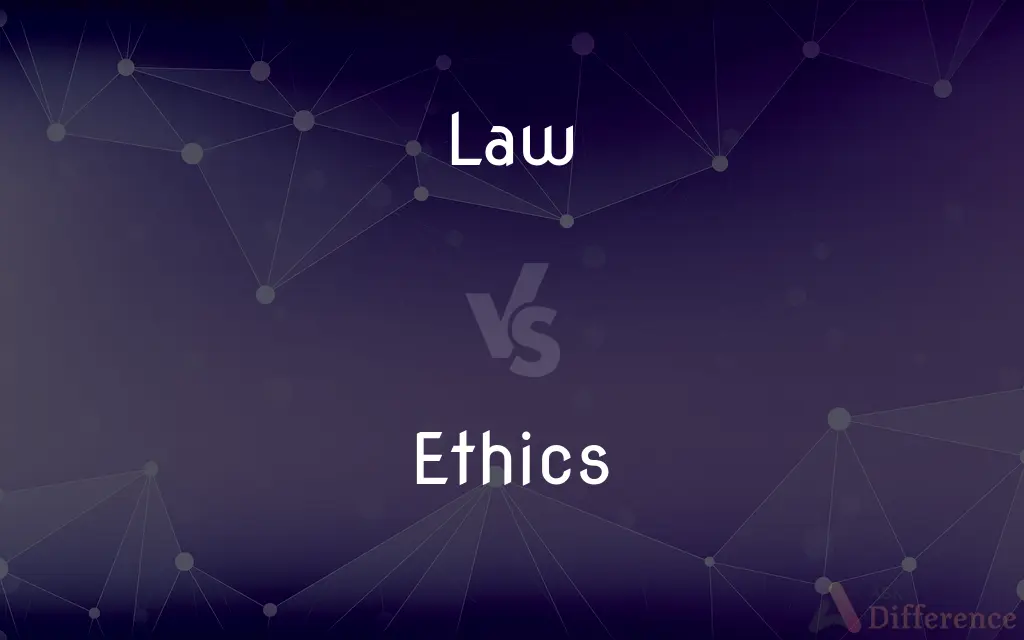Law vs. Ethics — What's the Difference?
Edited by Tayyaba Rehman — By Maham Liaqat — Updated on April 16, 2024
Law is a system of rules enforced through social institutions, ensuring compliance; ethics are moral principles that govern a person's behavior or conducting of an activity.

Difference Between Law and Ethics
Table of Contents
ADVERTISEMENT
Key Differences
Law is codified and enforceable by governmental and judicial systems, ensuring societal order through legal consequences. Ethics, on the other hand, are subjective and often vary between cultures and individuals, influencing behavior through moral considerations.
Laws are created through legislation and judicial decisions, making them formal and precise. Whereas ethics are often developed through societal norms and personal beliefs, lacking the formal structure of laws.
Individuals must adhere to laws to avoid legal penalties such as fines or imprisonment. Ethics, however, are self-enforced and breaches typically result in personal or societal disapproval rather than legal sanctions.
Laws can be amended or repealed based on societal needs and changes through a formal process involving legislative bodies. Ethics evolve more fluidly, influenced by changes in societal values and perspectives without a formal process.
Compliance with laws is monitored and enforced by authorities such as police and courts. On the other hand, ethical adherence is mostly a matter of personal conscience and societal judgment, without a dedicated enforcement body.
ADVERTISEMENT
Comparison Chart
Definition
Rules created and enforced by authorities.
Moral principles guiding behavior.
Basis
Legislation and judicial decisions.
Cultural, philosophical, and personal beliefs.
Enforcement
By governmental bodies, e.g., police, courts.
Self-regulated and socially enforced.
Flexibility
Relatively rigid, changes through formal process.
More flexible, changes with societal values.
Consequences of Breach
Legal penalties (fines, imprisonment).
Moral condemnation, social disapproval.
Compare with Definitions
Law
A written law passed by a legislative body.
The new statute prohibits texting while driving.
Ethics
Principles concerning right and wrong or good and bad behavior.
His morality prevented him from lying.
Law
A rule or directive made and maintained by an authority.
Environmental regulations limit emissions from factories.
Ethics
An inner feeling acting as a guide to rightness or wrongness of one’s behavior.
His conscience troubled him after the deception.
Law
Law derived from judicial decisions instead of statutes.
Common law in England evolved from centuries of court decisions.
Ethics
Behavior showing high moral standards.
Honesty is a virtue that she values above all else.
Law
A law set by a local government.
The city's ordinance requires all dogs to be leashed in public parks.
Ethics
A fundamental truth or proposition serving as the foundation for behavior.
They run their company on the principle of fairness.
Law
A systematic collection of laws organized by subject.
The penal code outlines all criminal laws and penalties.
Ethics
The quality of being honest and having strong moral principles.
A judge must uphold the highest integrity.
Law
A rule of conduct or procedure established by custom, agreement, or authority.
Ethics
Ethics or moral philosophy is a branch of philosophy that "involves systematizing, defending, and recommending concepts of right and wrong behavior". The field of ethics, along with aesthetics, concerns matters of value; these fields comprise the branch of philosophy called axiology.Ethics seeks to resolve questions of human morality by defining concepts such as good and evil, right and wrong, virtue and vice, justice and crime.
Law
Law is a system of rules created and enforced through social or governmental institutions to regulate behavior, with its precise definition a matter of longstanding debate. It has been variously described as a science and the art of justice.
Ethics
Moral principles that govern a person's behaviour or the conducting of an activity
A code of ethics
Medical ethics also enter into the question
Law
The body of rules and principles governing the affairs of a community and enforced by a political authority; a legal system
International law.
Ethics
The branch of knowledge that deals with moral principles
Neither metaphysics nor ethics is the home of religion
Law
The condition of social order and justice created by adherence to such a system
A breakdown of law and civilized behavior.
Ethics
A set of principles of right conduct.
Law
A set of rules or principles dealing with a specific area of a legal system
Tax law.
Criminal law.
Ethics
A theory or a system of moral values
"An ethic of service is at war with a craving for gain" (Gregg Easterbrook).
Law
A statute, ordinance, or other rule enacted by a legislature.
Ethics
Ethics (used with a sing. verb) The study of the general nature of morals and of the specific moral choices to be made by a person; moral philosophy.
Law
A judicially established legal requirement; a precedent.
Ethics
Ethics (used with a sing. or pl. verb) The rules or standards governing the conduct of a person or the members of a profession
Medical ethics.
Law
The system of judicial administration giving effect to the laws of a community
All citizens are equal before the law.
Ethics
(philosophy) The study of principles relating to right and wrong conduct.
Law
Legal action or proceedings; litigation
Submit a dispute to law.
Ethics
Morality.
Law
An impromptu or extralegal system of justice substituted for established judicial procedure
Frontier law.
Ethics
The standards that govern the conduct of a person, especially a member of a profession.
Law
An agency or agent responsible for enforcing the law. Often used with the
"The law ... stormed out of the woods as the vessel was being relieved of her cargo" (Sid Moody).
Ethics
The science of human duty; the body of rules of duty drawn from this science; a particular system of principles and rules concerting duty, whether true or false; rules of practice in respect to a single class of human actions; as, political or social ethics; medical ethics.
The completeness and consistency of its morality is the peculiar praise of the ethics which the Bible has taught.
Law
(Informal) A police officer. Often used with the.
Ethics
Motivation based on ideas of right and wrong
Law
The science and study of law; jurisprudence.
Ethics
The philosophical study of moral values and rules
Law
Knowledge of law.
Law
The profession of an attorney.
Law
Something, such as an order or a dictum, having absolute or unquestioned authority
The commander's word was law.
Law
A body of principles or precepts held to express the divine will, especially as revealed in the Bible.
Law
The first five books of the Hebrew Scriptures.
Law
A code of principles based on morality, conscience, or nature.
Law
A rule or custom generally established in a particular domain
The unwritten laws of good sportsmanship.
Law
A way of life
The law of the jungle.
Law
A statement describing a relationship observed to be invariable between or among phenomena for all cases in which the specified conditions are met
The law of gravity.
Law
A generalization based on consistent experience or results
The law of supply and demand.
Law
(Mathematics) A general principle or rule that is assumed or that has been proven to hold between expressions.
Law
A principle of organization, procedure, or technique
The laws of grammar.
The laws of visual perspective.
Law
(usually with "the") The body of binding rules and regulations, customs, and standards established in a community by its legislative and judicial authorities.
The courts interpret the law but should not make it.
In theory, entrapment is against the law.
Law
The body of such rules that pertain to a particular topic.
Property law
Commercial hunting and fishing law
Law
Common law, as contrasted with equity.
Law
A binding regulation or custom established in a community in this way.
There is a law against importing wallabies.
A new law forbids driving on that road.
The court ruled that the executive order was not law and nullified it.
Law
(more generally) A rule, such as:
Law
Any rule that must or should be obeyed, concerning behaviours and their consequences. mores.}}
"Do unto others as you wish them to do unto you" is a good law to follow.
The law of self-preservation
Law
A rule or principle regarding the construction of language or art.
The laws of playwriting and poetry
Law
A statement (in physics, etc) of an (observed, established) order or sequence or relationship of phenomena which is invariable under certain conditions. theory.}}
The laws of thermodynamics
Newton's third law of motion states that to every action there is always an equal and opposite reaction.
This is one of several laws derived from his general theory expounded in the Philosophiæ Naturalis Principia Mathematica.
Law
A statement (of relation) that is true under specified conditions; a mathematical or logical rule.
Mathematical laws can be proved purely through mathematics, without scientific experimentation.
Law
Any statement of the relation of acts and conditions to their consequences.
The law of scarcity
The law of supply and demand
Law
(linguistics) A sound law; a regular change in the pronunciation of a language.
Grimm's law
Dahl's law
Law
(cricket) One of the official rules of cricket as codified by the its (former) governing body, the MCC.
Law
The control and order brought about by the observance of such rules.
They worked to maintain law and order.
It was a territory without law, marked by violence.
Law
(informal) A person or group that act(s) with authority to uphold such rules and order (for example, one or more police officers).
Here comes the law — run!
Then the law arrived on the scene
Law
The profession that deals with such rules (as lawyers, judges, police officers, etc).
He is studying for a career in law.
She has practiced law in New York for twenty years.
Law
Jurisprudence, the field of knowledge which encompasses these rules.
She went to university to study law.
Law
Litigation; legal action (as a means of maintaining or restoring order, redressing wrongs, etc).
They were quick to go to law.
Law
An allowance of distance or time (a head start) given to a weaker (human or animal) competitor in a race, to make the race more fair.
Law
(aviation) A mode of operation of the flight controls of a fly-by-wire aircraft.
Normal law; alternate law; direct law
Law
(fantasy) One of two metaphysical forces ruling the world in some fantasy settings, also called order, and opposed to chaos.
Law
An oath sworn before a court, especially disclaiming a debt. wager of law", "wage one's law", "perform one's law", "lose one's law".}}
Law
(obsolete) A tumulus of stones.
Law
A hill.
Law
A score; share of expense; legal charge.
Law
(obsolete) To work as a lawyer; to practice law.
Law
To prosecute or sue (someone), to litigate.
Law
(nonstandard) To rule over (with a certain effect) by law; to govern.
Law
(informal) To enforce the law.
Law
To subject to legal restrictions.
Law
(dated) An exclamation of mild surprise; lawks.
Law
In general, a rule of being or of conduct, established by an authority able to enforce its will; a controlling regulation; the mode or order according to which an agent or a power acts.
These are the statutes and judgments and laws, which the Lord made.
The law of thy God, and the law of the King.
As if they would confine the Interminable . . . Who made our laws to bind us, not himself.
His mind his kingdom, and his will his law.
Law
In morals: The will of God as the rule for the disposition and conduct of all responsible beings toward him and toward each other; a rule of living, conformable to righteousness; the rule of action as obligatory on the conscience or moral nature.
Law
The Jewish or Mosaic code, and that part of Scripture where it is written, in distinction from the gospel; hence, also, the Old Testament.
What things soever the law saith, it saith to them who are under the law . . . But now the righteousness of God without the law is manifested, being witnessed by the law and the prophets.
Law
An organic rule, as a constitution or charter, establishing and defining the conditions of the existence of a state or other organized community.
Law
In philosophy and physics: A rule of being, operation, or change, so certain and constant that it is conceived of as imposed by the will of God or by some controlling authority; as, the law of gravitation; the laws of motion; the law heredity; the laws of thought; the laws of cause and effect; law of self-preservation.
Law
In mathematics: The rule according to which anything, as the change of value of a variable, or the value of the terms of a series, proceeds; mode or order of sequence.
Law
In arts, works, games, etc.: The rules of construction, or of procedure, conforming to the conditions of success; a principle, maxim; or usage; as, the laws of poetry, of architecture, of courtesy, or of whist.
Law
Collectively, the whole body of rules relating to one subject, or emanating from one source; - including usually the writings pertaining to them, and judicial proceedings under them; as, divine law; English law; Roman law; the law of real property; insurance law.
Law
Legal science; jurisprudence; the principles of equity; applied justice.
Reason is the life of the law; nay, the common law itself is nothing else but reason.
Law is beneficence acting by rule.
And sovereign Law, that state's collected willO'er thrones and globes elate,Sits empress, crowning good, repressing ill.
Law
Trial by the laws of the land; judicial remedy; litigation; as, to go law.
When every case in law is right.
He found law dear and left it cheap.
Law
An oath, as in the presence of a court.
Law
An exclamation of mild surprise.
Law
Legal document setting forth rules governing a particular kind of activity;
There is a law against kidnapping
Law
The collection of rules imposed by authority;
Civilization presupposes respect for the law
The great problem for jurisprudence to allow freedom while enforcing order
Law
A generalization that describes recurring facts or events in nature;
The laws of thermodynamics
Law
A rule or body of rules of conduct inherent in human nature and essential to or binding upon human society
Law
The learned profession that is mastered by graduate study in a law school and that is responsible for the judicial system;
He studied law at Yale
Law
The force of policemen and officers;
The law came looking for him
Law
The branch of philosophy concerned with the law and the principles that lead courts to make the decisions they do
Common Curiosities
How can ethical behavior be encouraged?
Through education, strong cultural values, and organizational policies that promote ethical standards.
What is the main difference between law and ethics?
Law is enforceable rules made by the government, while ethics are moral standards that guide behavior.
Can something be legal but unethical?
Yes, certain actions can be legally permissible but considered unethical in society.
Can ethical standards vary between cultures?
Yes, ethical standards can vary significantly between different cultures, as they are based on local values, traditions, and beliefs.
How are laws created?
Laws are created through legislation by governmental bodies and through judicial decisions in the case of common law.
What role does ethics play in professional settings?
Ethics guide professional behavior, influencing trust and integrity in various industries.
How do professional organizations enforce ethics?
Professional organizations enforce ethics through codes of conduct, disciplinary procedures, and, in some cases, professional licensing requirements that can include ethical training and evaluation.
Are laws based on ethical principles?
Many laws are founded on ethical principles, reflecting society's moral judgments about what is right and wrong, such as laws against theft or murder.
What happens if a law conflicts with an individual's ethics?
When personal ethics conflict with laws, individuals must still comply with the law to avoid legal penalties, though they might also seek to change the law through legal and democratic means.
Why are ethics important in government?
Ethics are crucial in government to ensure that power is used responsibly, to maintain public trust, and to prevent corruption, thereby promoting fairness and justice in governance.
Share Your Discovery

Previous Comparison
Promulgate vs. Propagate
Next Comparison
Traffic vs. TransportationAuthor Spotlight
Written by
Maham LiaqatEdited by
Tayyaba RehmanTayyaba Rehman is a distinguished writer, currently serving as a primary contributor to askdifference.com. As a researcher in semantics and etymology, Tayyaba's passion for the complexity of languages and their distinctions has found a perfect home on the platform. Tayyaba delves into the intricacies of language, distinguishing between commonly confused words and phrases, thereby providing clarity for readers worldwide.
















































